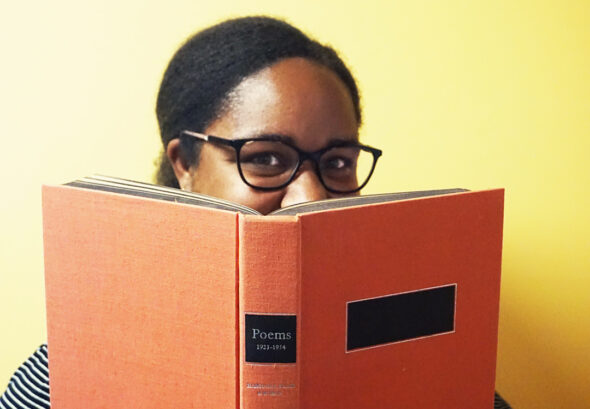
News writer and reporter Jessica Thomas' new column, "Unsolicited Opinions," opens up space dedicated to her opinions, books and sometimes other things. (Photo by Reilly Dixon)
Unsolicited Opinions | What is an antiracist tomorrow?
- Published: November 23, 2022
As a person of color in this community, I often find myself torn between feeling lucky to live where I do and wanting to scream at the constant state of “white people just not getting it.” After some interactions, I ask myself: “Was that intentional? Did I actually hear what I think I heard?”
Meditating on my experience, I am constantly reminded of Claudia Rankine’s book “Citizen: An American Lyric,” a collection of poetry, memoir and art exploring the Black experience from microaggressions to police violence. The first time I read “Citizen,” I couldn’t get past the first chapter. It was too difficult to read a text that so closely mirrored my experience — being stopped by the Yellow Springs Police Department because they “heard” I was part of a group that wrote Black Lives Matter outside of the police station, being called by the name of another Black woman in the village, feeling the bile rise in my throat when officers come to my house to deliver a Board of Zoning Appeals packet that could have been emailed.
I was recently asked to moderate the talk-back portion of the Yellow Springs Schools’ production of “Five Scripts Toward an Antiracist Tomorrow,” a play that explores parts of the Black experience in a way that extends Rankine’s work into the theater, creating palpable tension as patrons watch Black actors grapple with their character’s experience while moving through the world. If you weren’t able to make it, a recording of the performance will be available.
In one of the scenes I found most compelling, a Black student is talking to her white boyfriend about her unwillingness to ask her white roommate to remove a Confederate flag from their dorm room wall. The boyfriend comments that he is “down” with the cause, and the Black student calls him on it, exclaiming “You ain’t Black!”
While this conversation is not the pivotal moment of the scene, it is important in telling the story of white allyship. I’m sure that many people of color and members of marginalized groups have the experience of being harmed by something, having a white friend who understands the offense, and then needing to defend themselves to the “ally” who is more committed to calling out the injustice than understanding why the person from the marginalized group is hesitant to speak out.
During the talk-back portion, the actors said the work was “challenging,” that it “made them think” and that it had forever changed the way they would move through the world. I applaud them — I don’t think I could have performed that play.
Audience members said the performance was necessary, an opportunity for villagers to begin nuanced conversations on race, antiracism and the like. It was nice to hear, but Yellow Springs tends to have an abundance of visioning sessions resulting in an increase in Black Lives Matter yard signs, lackluster policy change or nothing at all. We were just on this hill — quite literally — when students walked out of school to protest the racist encounters they experienced.
Think about it. Does it make a difference if an “antiracist” person calls the police on their Black neighbor for being loud or having grass growing in their sidewalk? After weeks of protest and a list of demands, is adding funds to the police department the best our community can do? Are we considering how Black elected officials in our community are put under more scrutiny from their peers than their white counterparts?
Now, I don’t want readers to go away thinking that I didn’t appreciate and respect the work of Stephanie Radford, Lori Sparrow-Knapp or the cast of hardworking students. Their work was phenomenal and a testament to how invested these young people are in an antiracist future. What I’m trying to do here is ask my white friends and neighbors to not let the student’s efforts be in vain. Make a plan, list three things you can do to create an antiracist tomorrow, write it down, share it and do it. Do something.
*News writer and reporter Jessica Thomas’ column, “Unsolicited Opinions,” opens up space dedicated to her opinions about books and sometimes other things.
2 Responses to “Unsolicited Opinions | What is an antiracist tomorrow?”
The Yellow Springs News encourages respectful discussion of this article.
You must login to post a comment.
Don't have a login? Register for a free YSNews.com account.












White people — all people– have a plethora of things that others simply “just don’t get.” What makes us unique as individuals is made of the same substance that categorizes us apart from other individuals and groups. I remember when I was a teen I would think–actually believe–that someday we would all live in a world where race wasn’t something that was even acknowledged forefront upon meeting another human being. I just hated societal initially defining others by color. That is just the way we are wired. Nothing much has changed on that front. We still take note of Black, White, and variations in between. It’s hard to come to terms with something that seems unlikely to change. Love people. Lets strive to define our humanity by that. Blessings and Thank you for your column.
I do crap like this, Jessica. Thank you for calling me out (again). I’ve learned but still screw up and feel so ashamed when I see the quick flashes of hurt in the face of a Black friend. I hate it when a racist thought zooms through my mind, even though it’s a childhood leftover deeply ingrained. I can only promise you I will keep challenging myself to do this work. Thanks for holding up the mirror.